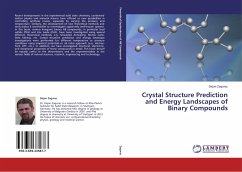Recent developments in the experimental solid state chemistry, condensed matter physics and material science have offered us new possibilities in controlling synthesis routes, especially by varying the pressure and temperature. Similarly, the development of new theoretical methods and tools makes it worthwhile to reinvestigate apparently well-known systems. In this book, various inorganic binary AB compounds, in particular lead sulfide (PbS) and zinc oxide (ZnO), have been investigated using several different theoretical methods, e.g. Simulated Annealing, Monte Carlo, Data Mining, etc. Crystal structure prediction and energy landscape investigations were performed for different temperature or pressure conditions using empirical potentials or ab initio approach (e.g. Hartree-Fock, DFT, etc.). In addition, we have investigated structural, electronic, and vibrational properties of these compounds in detail. This book should be equally useful to the theoreticians and the experimentalists in the various fields of natural sciences, research, engineering and technology.
Bitte wählen Sie Ihr Anliegen aus.
Rechnungen
Retourenschein anfordern
Bestellstatus
Storno

